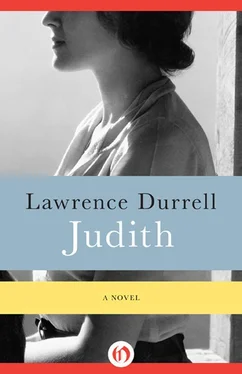6. The Long Arm of Chance
Mr. Donner was fated to be a policeman; it was not a question of vocation entirely, though he fitted the part and played it with a certain relish. He was in fact well cast, for he was a mountainous figure of a man who used his fat as extra weight when it came to exchanging shoves or blows with Arabs or Jews. Tall, of a deceptively babyish blondness and blue of eye, he could, when he chose, look as shy and innocent and bashful as only a Protestant Irishman can look. He had the brogue too — that slippery dialect accent which sorts so well with a national talent for hysteria or wheedling. Donner in his uniform was one thing — but Donner undressed… for at this very moment he was lying naked on his bed, enjoying the vague doze which helped him to pass away the siesta hour and digest a heavy meal, wallowing in the suds of beer. The Palestinian sun, instead of turning him brown, had only increased his pinkness; his flesh resembled somewhat the celluloid skin of a cheap doll. His knees and elbows wore large dimples. His legs were slightly bowed so that he stood awkwardly askew, which increased his air of apparent shyness. He breathed stertorously through his mouth, his straggling blonde moustache fluttering with the breaths. Mr. Donner… Inspector Donner, was sleeping the sleep of the just, from which he would be wrenched at a quarter to four by the silvery chime of an alarm clock. His little villa in the German colony was snug and well appointed for a bachelor. His Arab cook was good and cost little, though he thieved when he could. His office was within walking distance of his house and consequently most conveniently situated. But Mr. Donner was dreaming of himself in other circumstances, and in a more resplendent uniform than a police outfit. He saw himself walking about with modest vainglory, clad in the duds of a Staff-Captain (Substantive); nor was this entirely a dream, for he had, with great skill, managed to lobby himself the promise of precisely such a post on the Syrian Mission, and had that very day received confirmation of the fact that he would eventually be able to kiss his hand to the Force as well as to the Superintendent, who was a thorn in his side. The Superintendent could kiss his arse, thought Donner vindictively, as he lay with closed eyes, hovering between sleeping and waking. A single mosquito droned. He had forgotten to tell Abdul to fill the flit-gun. There! The clock had started to chime.
Donner hurled himself out of bed as if he were about to race the hundred yards in ten seconds flat. He caught up the clock in his great paw and strangled its voice. Then he stepped into his cool shower and slowly rotated his great pink bulk to enjoy it to the maximum.
He accompanied the delicious splashing of the water with appropriate sounds of physical gusto, hissing through his teeth like a grampus. Then he dried his rosy body and slipped into his uniform. He combed and set his moustache with great care, smoothed his eyebrows, and examined the cavities in his teeth. There was no fault to be found with what he saw — or at least he had none to find. Satisfied, he took up his black leather-covered swagger-stick, tipped on his hat cautiously so as not to disturb the parting in his hair, winked at himself in the mirror, and left the house to start walking with that wide bosomy stride which conveyed a certain feeling of charitable benevolence towards the world and its creatures. In his mind’s eye it was a military man who passed down the street — not an Inspector of the Palestine Police. It did not take him long to reach the police post. He touched his cap to the sentry and then, as he mounted the long staircase, thought that he might as well get his hand in again and try a real salute — a military salute — on his chief. The Superintendent sat brooding over his files, smoking a pipe. He had a long, petty, disappointed greyhound’s face and the airs of a churchwarden. He was unprepared for the evolution that Donner performed before his desk, bringing his heels together with a profound percussion and saluting so hard that his huge hand wagged by his ear.
“What the hell’s that in aid of?” asked the astonished officer, mildly. Donner grinned. “Military salute, Sir,” he said with pride.
“Aren’t you being a bit premature? Your papers haven’t even come through yet, you know.”
“Well — they can’t come too soon for me.”
“I see your point — with things hotting up as they are,” said the Superintendent with a touch of veiled irony, which his subordinate failed to notice.
“I’ll really be glad of the change,” said Donner in a heartfelt tone.
“If you call the desert a change,” said his superior with an acid smile. Donner looked grave. “Of course it will be!” he said reproachfully.
“Anyway, there’s little enough inducement to stay. They blew up another post this morning. Macintosh is dead and a dozen or so wounded.”
The two men looked at each other and sighed. “Why the hell don’t we clamp down on them?” Donner asked the world with an aggrieved air. The Superintendent puffed his pipe and reflected. The question, so often echoed, had become a piece of threadbare rhetoric by now. Donner was heartily glad to be within sight of leaving it behind him with his uniform. He sank into a chair and mopped his brow. He noticed that the Superintendent was holding one of the green Miko files. “Government House just sent in a Miko,” he said with an air of mild pride. They gazed at the file with respect, for it was only on rare occasions that the Secret Service asked the Police for a routine check on something. The Miko files suggested high romance to ordinary policemen, as well as a beguiling mystery, for they never saw who sent them. Somewhere in the cellars of Government House there was a mysterious man or men whose habits and interests were singular and mysterious.
“Does the name Roth mean anything to you — Judith Roth?” asked the Superintendent. Donner shook his head and held out his hand for the file. “Let me see,” he said. He loved to handle these highly romance-charged documents himself; but the Superintendent ignored the outstretched hand, thus demonstrating his superiority in rank and practically insinuating by the gesture that Donner, as his junior, did not merit the confidence of a personal glance at the typewritten sheet. It was like implying that Donner might possibly be “insecure”; fully aware of the insult, the Inspector frowned and coughed behind his hand. “Roth, Roth,” he mused, choking down his resentment and forcing himself to toady. “I can’t honestly say it does. Any other data?”
The Superintendent read slowly from the file with a suburban accent: “We have reason to believe that the Nazis are alarmed by the fact that this daughter of a famous scientist may have escaped to Palestine with his papers. Among the unpublished material there are, according to rumours which have been circulating in scientific bodies for some time, plans for a new type of engine. There is no need to stress that such material would be of the greatest interest to the British and American governments and would be worth an immense sum of money to obtain or even to deny to the enemy.”
“Money,” said Donner reflectively, as if the word was new to him. “What do you know?”
“We have only one rather old picture of the lady taken from the press.” As if making a great concession, the Superintendent passed a cutting across the desk to his junior. It showed Isaac Roth receiving the Nobel Prize for Physics the year before his death. A dark-haired, rather handsome and very young girl stood by him, her hand on his arm, her unsmiling eyes gazing into the camera. Donner brooded on this. “It’s a very common type,” he said. “Must be thousands like her in the world.”
Читать дальше












